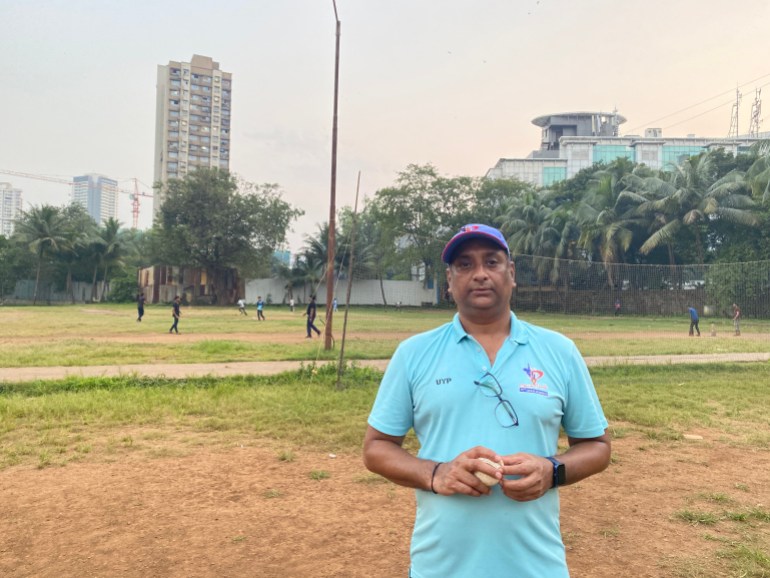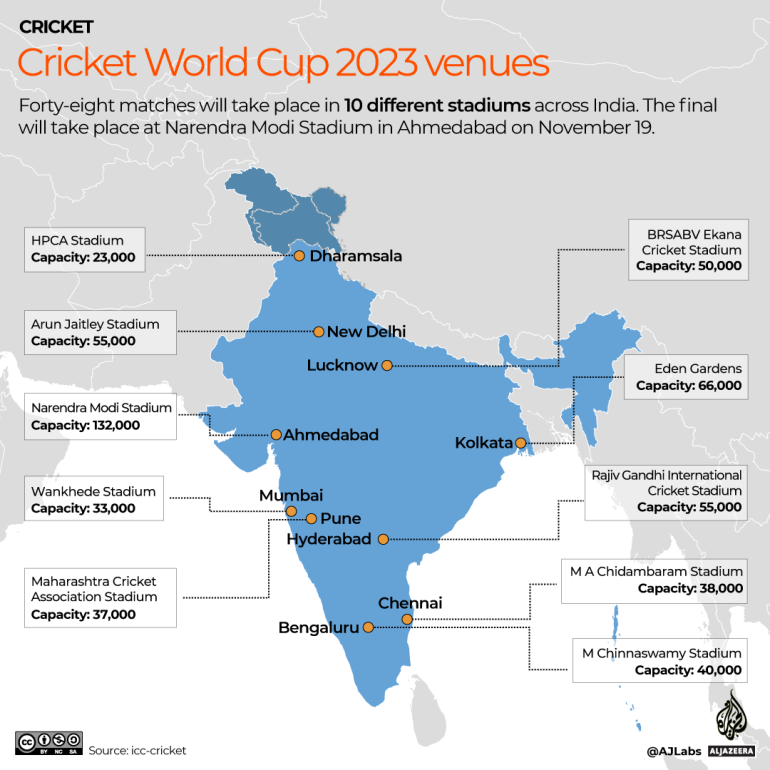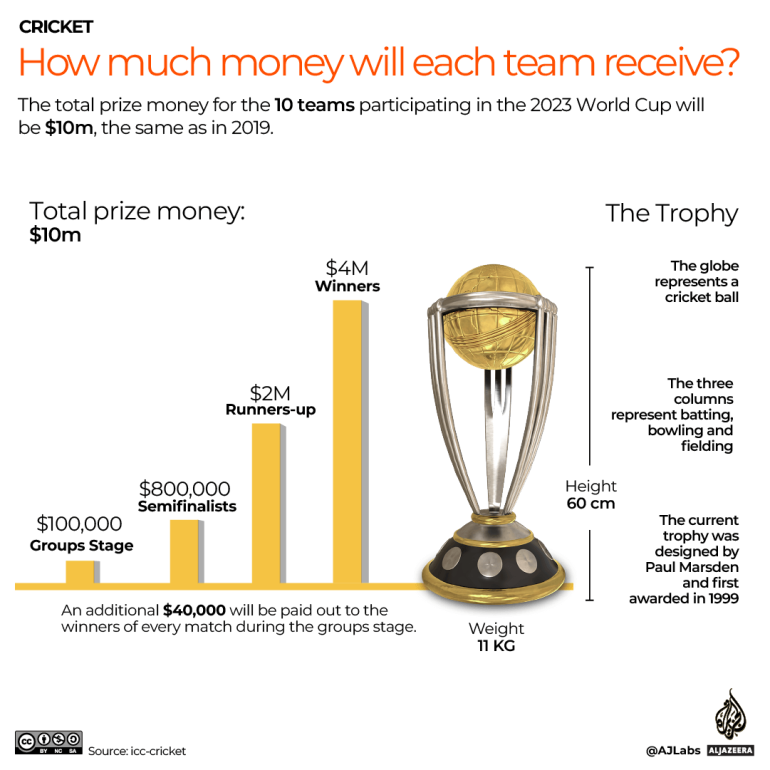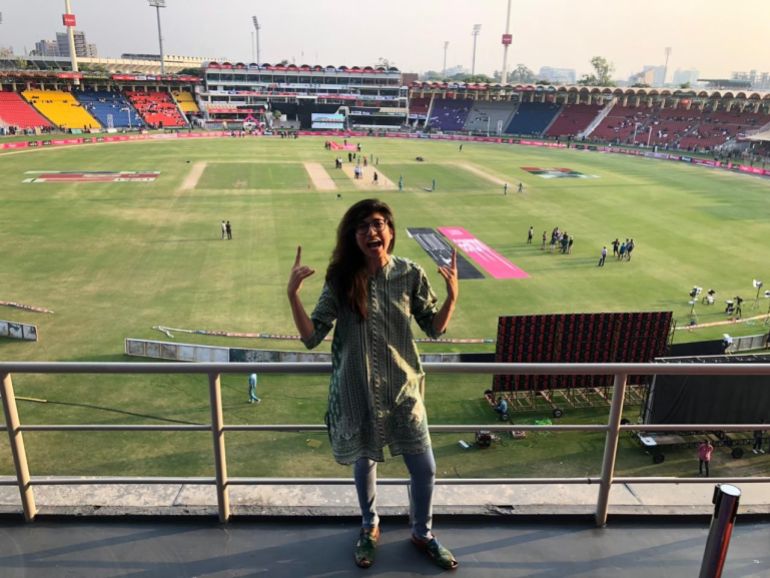Cricket matches between those neighbouring countries are known for their intensity, with the rivalry going well beyond the field.
The nuclear-armed South Asian neighbours share a fraught relationship and have fought three wars since 1947 when India was partitioned after independence and Pakistan was created.
There has been a sharp deterioration in relationships between the two countries since the 2008 attacks in India’s western city of Mumbai, where more than 160 people were killed and a Pakistan-based armed group was named as the suspected mastermind, as well as over Kashmir.
Due to political tensions, crossing the border for cricket is a rarity for both teams. Neither team has travelled to the other’s country for a bilateral series since Pakistan’s trip to India for an ODI series in 2012-13.
Saturday’s World Cup clash in Ahmedabad’s Narendra Modi Stadium – the world’s largest cricket venue, boasting a 130,000-plus capacity – has thus been billed as the biggest match in recent history as India: the number one ranked ODI team hosting second-ranked Pakistan.
Both India and Pakistan head into the match with two World Cup wins in two games.
“It’s an epic. You shouldn’t miss this match in a lifetime,” Harish Iyer, an India fan, told Al Jazeera.
“It’s a huge pressure game for players but it’s wonderful for fans. You are elated when you see India win, you’re on cloud nine for weeks. But when they lose, it’s extremely upsetting.”

The craze among Indians for the highly-anticipated match has been extraordinary, with tickets being sold for as high as $300,000 in the resale market, although fans in Pakistan have not been able to get visas to travel.
Mahesh Balakrishnan, a local cricket coach in Mumbai, described the game as a “purely temperamental match”.
“With India and Pakistan, what comes into the picture is the weight of expectation,” he said. “It’s the pressure that has been built up by the millions of people who are supporting India. Players have to absorb the pressure … whoever has the nerve will win the match.”
However, Balakrishnan played down the hype around the political rivalry seeping into cricket.
“From what we can see on TV, the India and Pakistan players get along very well. They are very pally. It’s only the media that hype it up for publicity and make it a big issue of it,” he said.

Aarush Tiwari, a 12-year-old aspiring cricketer, said he does not sense any feeling of animosity among India and Pakistan players.
“They show sportsmanship,” said Tiwari. “Personally, I also look up to Pakistan players for their cricketing qualities.”
Muhammad Rizwan, who struck a century in Pakistan’s last game, is a fan favourite among Indians – some backlash over pro-Gaza comments notwithstanding – along with skipper Babar Azam and bowler Haris Rauf.
Iyer, though, thinks that Pakistan’s current squad lacks star players.
“When you have star players, you have that aura. In the early 2000s, they had many stars who could turn a match around,” he said, referring to former captain Wasim Akram and fast-bowling legend Shoaib Akhtar.

This year’s tournament marks the first time Pakistan have played on Indian soil since the 2016 Twenty20 World Cup.
Due to the bitter relations between the countries, the teams usually face each other only in ICC events and the Asia Cup on the international stage.
Players from Pakistan have also been shut out of the Indian Premier League, the lucrative T20 franchise tournament, since 2008 following the Mumbai attacks.
Iyer said the debate over IPL participation is complicated as “politics takes precedence” in this situation.
Youngster Tiwari, though, would enjoy the prospect of Pakistani bowlers playing against Indian batters in the world’s top T20 competition.
“It’ll be fun if Pakistanis are allowed to play in the IPL because the league needs more top bowlers, which Pakistan have,” Tiwari said. “They have great fast bowlers and spinners, so if they play, the league’s quality will be even higher.”
Abid Hussain in Islamabad, Pakistan – Pakistani fans have been left to rue the geopolitics which means they are unable to receive visas to attend the match, despite repeated promises by the International Cricket Council (ICC) and the Board of Cricket Control in India (BCCI) that they would be able to do so.
However, it still has not dimmed the excitement of many fans about the upcoming match, even if most of them believe India will emerge as the victors.
Eman Tufail is a 25-year-old UX strategist by day and a content lead for cricket coverage platform Grassroots Cricket by night, who is based in Karachi, southern Pakistan.
She says India’s mighty batting and bowling makes them a “scary proposition” to play.
“I think everybody expects them to do well in the tournament, which is on their home ground, and they were perhaps the most in-form team coming into the World Cup,” she told Al Jazeera.

Anam Nadeem, a 36-year-old cricket writer and a podcast host living in the Pakistani city of Sialkot, says that the Indian cricket team has given Pakistani fans several “heartbreaks” over the years.
“We have faced India seven times in 50-overs Cricket World Cup and lost every single one of those matches. It is difficult for an average Pakistani fan to overcome the accumulated trauma caused by the Indian team,” Nadeem told Al Jazeera.

The last time two teams played against each other was in the Asia Cup in September, which was scheduled to be hosted in Pakistan but due to BCCI’s insistence, was largely moved to Sri Lanka.
After the first-round match was washed out, the second-round match saw India give Pakistan a memorable shellacking, inflicting a 228-run defeat, with former captain Virat Kohli scoring a majestic century.
26-year-old Abdus Saboor, an Islamabad-based dentist, still had bad memories of the match fresh in his mind, as he warmed up with his friends to play a game of indoor cricket.
“Look, India-Pakistan games are already so full of pressure and when you have the monkey of 7-0 on your back, it gets difficult to cope,” the dentist told Al Jazeera in between stretches.
“If you compare the two teams on paper, India’s individual firepower is so much more than Pakistan’s in both batting and fielding and then they have Kohli. He is a big match player and the kind of track record he has against us, and his ice-cool ability to chase, he can win the match for India single-handedly.”
Nadeem felt that the cordial relationships between the teams, and especially the love shown for Kohli, shows that the players are “more vocal about the warmth and mutual respect they have for each other as athletes”.
“The constant political war and the inbuilt hostility in an average Indian or Pakistani blind them from seeing how similar people are from each side of the border,” she added.
Tufail says that the IPL remains a “sore spot” for Pakistani fans as a tournament which prides itself as a “festival of cricket” but does not include Pakistani players.
“It is a cruel reminder of how we are not given due importance in world cricket, and nobody even says anything. Journalists you respect, players you like; they all remain quiet. It’s an irrational anger, perhaps, but why doesn’t anybody speak up about this?” she asks.
Saboor, the dentist, points out that while not playing in the IPL meant the Pakistani players had no experience with Indian conditions, he blamed the BCCI for excluding Pakistan from the T20 tournament.
“On one hand, they want to keep us away from IPL, but on the other, whenever they get a chance, they use our presence for their own gains, like how they are holding a major function before the match on Saturday,” he says, referring to the proposed plan by the BCCI to host a ceremony before the game.
Kickstarting the much-awaited #INDvPAK clash with a special performance! 🎵
Brace yourselves for a mesmerising musical special ft. Arijit Singh at the largest cricket ground in the world- The Narendra Modi Stadium! 🏟️
Join the pre-match show on 14th October starting at 12:30… pic.twitter.com/K6MYer947D
— BCCI (@BCCI) October 12, 2023
While both Saboor and Tufail said that they would rather watch the match within the comfort of their homes and manage their “pain and joy” on their own, podcast host Nadeem wistfully says it would have been a dream come true for her to be present in Ahmedabad.
“If it was an ideal world, I’d have been in the stadium with several other Pakistani fans, singing Dil Dil Pakistan [Pakistan in every heart],” she said.
“Alas, there is no ideal world, and as a Pakistani, all we can do is watch from afar.”
